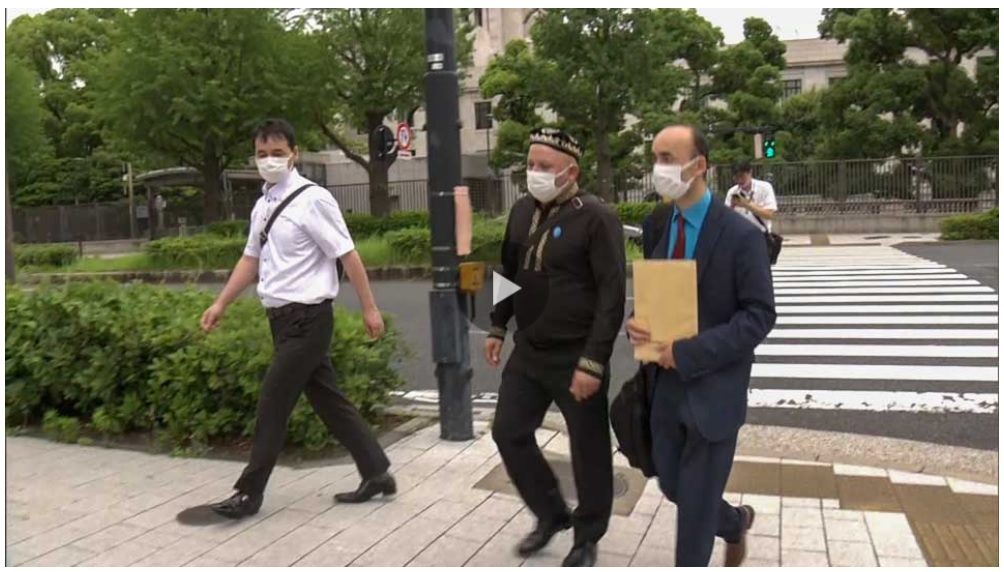Far from China, Uighurs abroad still feel pressure
- 2020/7/29
- English

NHK WORLD – JAPAN, Wednesday July 29, 2020
“The pages of George Orwell’s 1984 are coming to life there.”
This was how US Secretary of State Mike Pompeo described the situation in the Xinjiang Uygur Autonomous Region, western China, where authorities are monitoring and restricting the activities Uighurs and other Muslim minorities in the name of combating terrorism. And now there are signs that Beijing has expanded its surveillance to include Uighurs living overseas.
NHK spoke to one of the thousands of Uighurs living in Japan who has firsthand experience of China’s far-reaching influence.
End of a peaceful life
Halmat Rozi, born and raised in Xinjiang, arrived in Japan 15 years ago to attend graduate school. After finishing his studies, he worked at a construction company before opening a Uighur restaurant in Chiba Prefecture three years ago.
But in 2018, this peaceful life was brought to an abrupt halt when he learned that three of his wife’s relatives back in China had been detained. When he reached out to his family in Xinjiang, they warned him not to get in touch. This has made it nearly impossible for him to get updates on their situation.
Rozi began taking part in demonstrations in Japan against China’s treatment of the Uighurs. Last year, he became a board member of the Japan Uyghur Association, a group representing Uighurs living in Japan.
Surveillance beyond Chinese borders
This May, Rozi received a rare video call from his older brother, Arken, who lives in Xinjiang. He picked up to find his brother sitting in an unfamiliar location. Throughout the conversation, Arken repeatedly asked Rozi whether he had participated in demonstrations critical of the Chinese government. Rozi became suspicious and took photos of the conversation using another phone. He asked his brother where he was, but Arken would only say, “I’m okay. No need to worry.” Rozi asked if there was anyone else but Arken reassured him, moving the camera to show his surroundings and saying, “There’s no one. Don’t worry.”
But just as they were wrapping up the call, Rozi says a man he had never seen before suddenly appeared. The man said he belonged to a government organization and told Rozi, “China is forever your motherland. I want to be your friend and talk about many issues.” He urged Rozi to provide information on the Japanese Uyghur Association’s activities, and said he would be in touch.

Rozi could tell his brother was nervous.
The next video call came four weeks later. Rozi had told NHK about the first call, and so a crew was there with him to record the scene.
After the brothers had a short conversation, the same man appeared. He described himself as a member of the state security bureau, a Chinese intelligence agency. Rozi asked for proof and the man briefly displayed a black object emblazoned with the Chinese characters for “national security.” It is an abbreviation commonly used by members of the state security apparatus.

A man appeared on the call and showed Rozi an ID card with the Chinese characters for “national security.”
The man demanded Rozi provide the date and location of the association’s meetings, along with the names of members.
“Just cooperate with us and there will be no trouble for your brother and family,” the man said. He offered to provide Rozi with the official Chinese documents he would need to apply for Japanese citizenship.
“They know everything you do in Japan,” Arken told Rozi. “You should cooperate with them as much as possible.”
Rozi said he would think about it and then hung up. He looked weary and sighed deeply.
“My brother could be under heavy pressure,” he said. “I feel so depressed and I don’t know how to describe it. Why do Uighurs have to face things like this?”
Fear of international criticism
Rozi’s predicament is not unusual. Amnesty International says many Uighurs living abroad face similar pressure from Chinese authorities.
In February, the organization published a report after interviewing around 400 Uighurs living in 22 countries. It found that at least 26 of those interviewed had been approached by the authorities and asked to become informants. The report concluded that Chinese security officials are making “aggressive efforts” to recruit Uighurs living abroad to spy on their communities.

Amnesty International is calling for the closure of all Uighur detention centers.
Experts say Chinese authorities feel threatened by overseas Uighur communities, believing that any comments critical of Beijing could attract more international attention to the issue.
The crackdown in Xinjiang is part of the hardline policies President Xi Jinping has employed to maintain the stability of the Communist Party. He has identified the region, along with Hong Kong, as potential threats to party rule.
Implications on US-China relations
The situation in Xinjiang is deepening the rift between the US and China. In June, President Donald Trump signed the Uyghur Human Rights Policy Act into law after it sailed through Congress with bipartisan support. The law claims that the Chinese government is detaining over one million Uighurs and other Muslim minorities in internment camps located throughout the region. It also says that former detainees claim to have been subjected to forced political indoctrination and torture, among other abusive practices.
One month later, the White House announced a range of sanctions, such as asset freezes and bans on entering the US, on Chinese officials involved in the program. Those targeted include Chen Quanguo, a Xinjiang Communist Party leader and Politburo member.
Beijing claims the camps are only for those who have been radicalized by Islamist thought, and helps them overcome these beliefs and provides them with job training. It has hailed the program as a success, claiming that there have been no terrorist acts in Xinjiang for over three years.
A Chinese foreign ministry official called the US sanctions an interference in the country’s internal affairs, and announced similar sanctions on US senators Marco Rubio and Ted Cruz, and other high-profile government officials.
Rozi calls for Japan’s help
After much soul searching, Rozi says he decided not to collaborate with the Chinese authorities. Instead, he says he is devoting himself to spreading awareness of the plight of the Uighurs through the media.
In June, Rozi visited Tokyo with other members of his group. They handed out a petition to Japanese lawmakers calling for a law similar to the one passed in the US. He says Japan must do something because inaction is a form of tacit approval.
“I can’t keep quiet,” he says. “If someone doesn’t speak up, the problem will be hidden. I hope the Japanese government will work to protect our families. We need any help we can get.”

A group of Uighurs living in Japan submitted a petition to Japanese lawmakers calling for their support in June. Watch video: 10:09
To avoid any further overtures from the Chinese authorities, Rozi has cut off contact with his relatives for now. He says it was a painful decision, and that all his hopes rest with Japan and the international community.
https://www3.nhk.or.jp/nhkworld/en/news/backstories/1222/





















